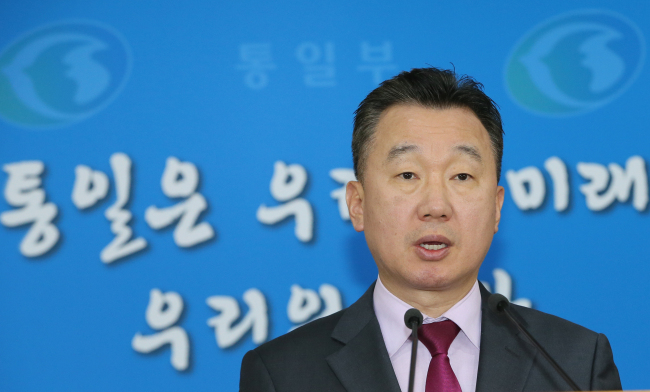The two Koreas agreed Friday to hold a working-level meeting next Thursday to arrange high-level government talks on a range of bilateral issues, raising the prospects that cross-border relations will improve.
 |
| Unification Ministry spokesperson Chung June-hee speaks during a press briefing on Friday. (Yonhap) |
Seoul’s Unification Ministry said that it accepted Pyongyang’s proposal earlier in the day to hold the meeting at Tongilgak, a building on the North Korean side of the inter-Korean border village of Panmunjeom.
“Our acceptance of the proposal reflects our resolve to conscientiously execute the Aug. 25 agreement,” a ministry official told reporters, referring to the bilateral deal to defuse tensions and improve frosty relations.
“At the working-level talks, the two sides will discuss details about the higher-level talks: who will attend the talks, when they will be held and what kind of issues will be included in the agenda,” the official added on customary condition of anonymity.
In the morning, the North’s Committee for Peaceful Unification of the Fatherland proposed the talks. The proposal came after Pyongyang rejected Seoul’s overtures for dialogue three times in September and October.
At the talks, the North’s three-member delegation will be led by a senior official of the committee, while the South will be represented by Kim Ki-woong, director-general of the Unification Ministry’s Special Office for Inter-Korean Dialogue.
Seoul had been pushing for the high-level government talks to address a series of thorny issues including the humanitarian issue of families separated by the border, in line with the Aug. 25 deal.
Under the deal, which was reached after tensions spiked due to the North’s landmine provocation on Aug. 4 and an exchange of artillery fire on Aug. 20, the two sides agreed to ease military tensions, seek regular high-level talks and bolster civil-sector exchanges.
Before Pyongyang’s proposal for the talks on Friday, Seoul proposed dialogue three times — on Sept. 21 and 24, and Oct. 30. Seoul made the proposal to Kim Yang-gon, the director of the ruling Worker’s Party’s United Front Department, in the name of its Unification Minister Hong Yong-pyo.
Pyongyang rejected the offers, arguing that Seoul was not sincere about the talks.
When the North first rejected the offer, it criticized South Korean civic groups’ dissemination of anti-Pyongyang leaflets, lawmakers’ moves to enact a North Korea human rights law and news reports on North Korean provocations.
On the agenda for the high-level government talks are expected to include the lifting of Seoul’s “May 24” economic sanctions against Pyongyang, the resumption of tours to Mount Geumgangsan and Seoul’s push for building a peace park in the Demilitarized Zone.
For the North, the lifting of the May 24 sanctions is critical as it seeks to improve its economy, while the South prioritizes addressing the issue of separated families.
Seoul maintains that the economic sanctions, which were imposed after Pyongyang’s attack on the Cheonan in March 2010, can only be terminated if the regime’s apologizes for the attack, takes steps to prevent a recurrence and punishes those who carried it out.
By Song Sang-ho (sshluck@heraldcorp.com)

